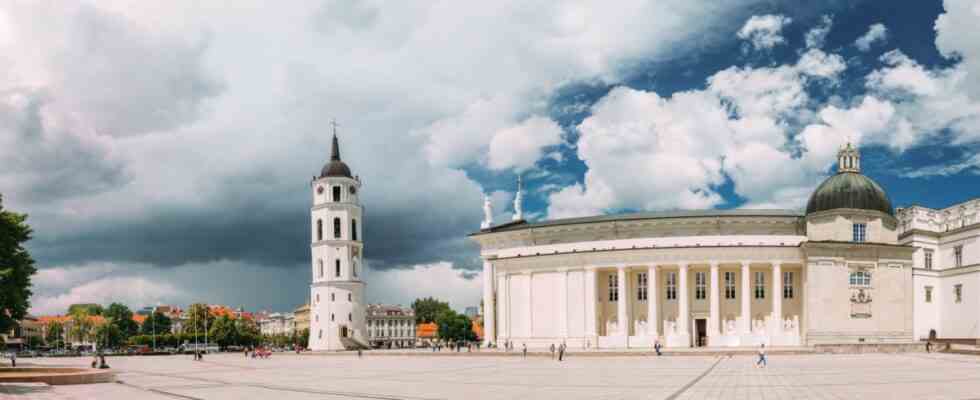The memory – maybe it’s not just a searching movement, but also its own, wafer-thin layer in which the moments of the past are collected. An “invisible sphere”, as Tomas Venclova once called it, “like an ice light / flickers over the visible world”. In this sphere the appearances are constantly changing. The June winds of a lake landscape can just be felt, the muffled noise of an engine can already be heard, only to experience the shadows of trees on a wall, in a different place, in a different time.
In his poems, the Lithuanian poet Tomas Venclova repeatedly describes himself as a poet of the particular. “Everything flows”, the famous sentence of Heraclitus reminds him of his curiosity about “what only once was and will be”. And in fact there are countless details in his verses, not only moments of perception or landscape sketches, but also historical splinters. It can be as much about the world of the city of Klaipėda before the start of the Second World War, where Venclova was born in 1937, as it is about stories from the day the Wall came down in Berlin.
The memory sometimes also depends on the form, the rhythm or the meter
These different elements are always engaged in a reflective movement in which observation and imagination interpenetrate. As you read, you get the impression that Venclova is not just about celebrating the details, but about distilling the essence of each part. To defy impermanence. It seems that language alone, with its rhythm, its sound and its range of meanings, can oppose the time, the “cunning censor”.
And with Venclova, this language always consists of several tones, from casually dabbed everyday words to pathetic gestures. In the same way, he brings the voices of the dead into his verse: stories of deceased friends or quotations from poets like Derek Walcott. Above all, however, memories of the numerous victims of historical crimes and systemic violence. In addition, motifs from ancient myths or from the Bible.
Finer are those allusions that have entered the structure of the poems: ode forms, hymns, certain metering, which can also be found in Ossip Mandelstam or in WH Auden. Venclova writes verses that deal specifically with the world of his perceptions and his life story and in which the entire tradition and knowledge of historical fractures resonate. What unfolds as you read are images of a “landscape of bondage,” as it was once called – and time and again a faint hope glimmers in Venclova’s poems that there could be something like a “different order.”
Tomas Venclova: Variation on the theme of awakening. poems. Translated from the Lithuanian by Cornelius Hell. With an afterword by Michel Krüger. Edition Poetry Cabinet. Carl HanserVerlag, Munich 2022. 112 pages, 20 euros.
As the son of the writer Antanas Venclova, who was loyal to the regime, he was protected from persecution in some situations in Lithuania during the Soviet era. At the same time, the regime saw him early on as a “person with unacceptable views,” as he put it in an interview. Exhausted by the constant surveillance by the secret service, he was able to emigrate to the USA in 1977, where he taught literature at Yale. Today he lives in Vilnius again. But Venclova is still on the move. He dedicated a whole poem to one of his trips between the USA and Lithuania. Flying over cities and landscapes, the speaker looks melancholy at his present and lets Uranos, Kronos and Mnemosyne roam through the verses one after the other.
This tendency to mix “continents, lagoons, epochs” does not always get by without general statements that sometimes solidify into a sentence: “Man, as we know, is the only one on earth / who has so much wisdom that he is more powerful / as the force of nature.” Venclova is much stronger where he stores the passage of time and the political interpretation in supposedly tiny details: “On the (…) snowdrift of a cappuccino / presses the weight of sugar / fingers rummage in the tablecloth, turpentine / penetrates in the armor of the thujas”.
The selection of this volume, on which Venclova himself collaborated, draws a beautiful trail through his poetry of the last 20 years. The translator Cornelius Hell did a great job of replicating Venclova’s rhythm, the play with meter and the change in verse speed. In some places he reaches even deeper into the register of pathos than the author himself, for example in formulations such as “on the beach” or “in the lap”. But he finds very beautiful solutions for those rhymes with which Venclova, the poet of remembrance, ends his volume: “The vaults, uninhabited, flow / over cells that have become useless. / The skeleton of a monastery sprout / instead of Nirvana only stones here above.”

